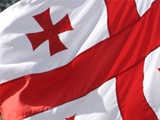Today.Az » World news » Georgia builds 'tourist paradise' near conflict zone
22 April 2011 [11:42] - Today.Az
 The roar of machinery mingles with the cries of gulls hovering over the beach as swarms of construction workers build a huge new tourist resort - on the edge of a conflict zone.
The roar of machinery mingles with the cries of gulls hovering over the beach as swarms of construction workers build a huge new tourist resort - on the edge of a conflict zone.
The village of Anaklia lies in a Black Sea coastal region which saw fighting with separatist militiamen less than three years ago, and Georgia is building the multi-million-dollar resort there in the hope of luring holidaymakers to the frontier of the rebel-held territory of Abkhazia.
Russian troops who guard the disputed borders of Abkhazia are stationed just across the river from Anaklia, but despite the security concerns, Georgia's larger-than-life President Mikhail Saakashvili has defended the grand scheme as a "response to occupation and destruction with construction and development".
This is Saakashvili's latest pet project after the high-profile reconstruction of Georgian towns like Batumi and Sighnaghi, and he brought in one of his favourite architects, Spaniard Alberto Domingo, to transform Anaklia's landscape.
Domingo has reshaped the beach, built a new seafront promenade, turned a large wetland area into a big public park and designed a 555-meter-long pedestrian footbridge that will leap across the mouth of the Inguri River.
This summer, a new airport will also allow sunbathers to fly directly from the Black Sea shore to the snow-capped mountains of nearby Svaneti to ski. The construction of the bridge, two imposing hotels, a yacht club and several cafes is due to be completed by June 2011.
But this is just the beginning, said the head of Georgia's Investment Agency, Keti Bochorishvili, and "even more ambitious projects" are to follow. The government has offered investors a package of attractive bonuses, such as nearly four hectares of seaside land free and a tax waiver for 15 years, which has already attracted interest from business groups from the US, China, India, Turkey, Israel and Ukraine as well as from local companies.
Bochorishvili said the project would help to attract much-needed foreign investment, boosting the economy and creating new jobs. In Anaklia, just as in the rest of Georgia, high unemployment is a burning issue, and locals were understandably delighted by the prospect.
"Anaklia was a godforsaken corner and now it is becoming so beautiful. There will be tourists from all over the world and new jobs for us. What else we could dream about?" said 32-year-old Anaklia resident Raul Shelia. President Saakashvili's opponents, however, described the project as a "sham without substance."
"A resort cannot exist near a conflict zone," said Levan Berdzenishvili, one of the leaders of the opposition Republican Party. "It is an unimaginable waste of energy, time and public funds." The Anaklia resort complex is clearly intended to be politically symbolic.
The government believes that it will help to show people in impoverished Abkhazia that life would be better within an economically-successful Georgian state rather than in an isolated breakaway enclave which Tbilisi describes as territory "occupied" by the Russian troops stationed there. "Of course, this touristic project fits our soft power approach towards the occupied territories," Saakashvili said. "It is a long term approach obviously that finally will allow the peaceful reintegration of all Georgian regions."
But officials in Abkhazia argue that Georgia has been strangling the region with an economic blockade for many years, and that Saakashvili's project is simply political posturing. "The Georgian president is only working for populism and not for the real benefit of people living in Georgia," said the foreign minister in the Abkhaz rebel government, Maxim Gunjia.
Backed by Russia, Abkhaz separatists waged a civil war with Georgian forces in the 1990s that killed several thousand people and drove 250,000 more, mostly ethnic Georgians, out of the region. In the aftermath of the brief war between Georgia and Russia in 2008 over Abkhazia and another separatist province, South Ossetia, the Kremlin recognised both regions as independent states.
Instead of fighting again, Saakashvili says he now wants to make a peaceful appeal for unity to those living on the other side of what he calls the new "Berlin Wall" - the disputed frontline which lies so close to his new tourist hotspot of Anaklia. "We are telling our fellow citizens beyond this irrational Berlin Wall erected on a sandy beach that we will all be part one day of the same future," he said.
/Hurriyet Daily News/
|
|